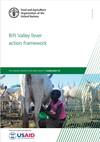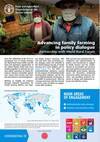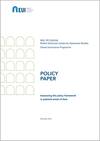This Rift Valley Framework Action Framework is intended to provide decision makers with guidance on the best course of action to take in response to an RVF outbreak or the risk of an outbreak, and help them develop a national action plan for this response. A coordinated One Health approach that brings together the public, animal and environmental health sectors is recommended, as is a risk-based approach that uses risk assessment and mapping to determine the appropriate measures to be taken and the locations where they are required. A country’s RVF response can be best broken down into the four phases of the epidemiological cycle: the inter-epidemic, pre-epidemic, epidemic and post-epidemic periods.
Year of publication: 2022Organization: Food and Agriculture Organization of the United Nations (FAO)
Topic: Environmental services, Resilience, Social services
Language: English
Type of document: Technical
Geographical coverage: West Africa, Central Africa, Eastern Africa, Southern Africa
To promote FAO's work in partnership with civil society organizations (CSOs), PSUP has produced partnership briefs to highlight work done in recent years with some CSO partners. This specific brief highlights the work done together with World Rural Forum particularly those activities in support of the UN Decade of Family.
Year of publication: 2022Organization: Food and Agriculture Organization of the United Nations (FAO)
Topic: Climate change, Economy, Environmental services, Food security, Innovation
Language: English
Type of document: Technical
Geographical coverage: Global
Pastoralism in Asia features a variety of agro-ecological and socio-cultural settings. From Russian Siberia to Indian drylands, the continent is home to large and diverse pastoral territories and communities. Policies and legislation regulating rangeland governance and livestock production are of great concern in the region, as they affect the livelihoods of significant parts of the population.
Year of publication: 2022Organization: Individual authors
Topic: Climate change, Conflict, Economy, Environmental services, Food security, Land, Resilience, Social services
Language: English
Type of document: Technical, Policies and legislation
Geographical coverage: Central Asia, South Asia
Transboundary pastoralism is practiced in CAR by Cameroonian, Chadian, Sudanese, and South Sudanese groups of herders. This activity is met with challenges ranging from cattle theft, farmer grazier problems, and armed groups activities which lead to incidents that are at times fatal. Data from the Armed Conflict Location & Event Data Project (ACLED) publicly available, were analyzed to identify locations where a transhumance incidence occurred and subprefectures that are access constraints and food insecure due to the occurrence of transhumance incidences. Hotspot analysis provides a way to show the relationship between features and whether high or low values cluster spatially.
Year of publication: 2022Organization: World Food Programme (WFP)
Topic: Conflict, Food security, Resilience
Language: English
Type of document: Technical
Geographical coverage: Central Africa
In this paper we focus specifically on differences in the welfare impacts of COVID-19 on rural livelihoods between countries using nationally representative data that we disaggregate by food system typology. This typology captures key structural differences in the organization of rural economies and the vulnerabilities to rural livelihoods due to the COVID-19 pandemic and associated lockdown measures. In particular, we draw on household survey data collected from 54 countries through the World Bank’s COVID-19 High Frequency Monitoring Dashboard to generate descriptive data on COVID-19 impacts in rural areas across three dimensions: income, coping strategies and food security.
Year of publication: 2022Organization: Food and Agriculture Organization of the United Nations (FAO)
Topic: Food security, Gender and youth, Social services
Language: English
Type of document: Technical
Geographical coverage: Global
Land degradation neutrality (LDN) has been defined by the Parties to the Convention as: A state whereby the amount and quality of land resources, necessary to support ecosystem functions and services and enhance food security, remains stable or increases within specified temporal and spatial scales and ecosystems. The present report is an overview of the status of land degradation neutrality (LDN) in the region including a national overview for the 17 programme countries.
Year of publication: 2022Organization: Food and Agriculture Organization of the United Nations (FAO)
Topic: Environmental services, Land
Language: English
Type of document: Technical
Geographical coverage: Europe, Central Asia
Unlike other regions of the world, the policy framework in Europe is in principle favourable to extensive livestock farming. EU policies recognise the multiple values of pastoralism and its contributions in terms of cultural heritage, environmental management and territorial cohesion. Recognising that these public goods are not sustainable without remuneration, the EU supports pastoralists with direct and indirect measures, including subsidies. The EU institutional architecture and policy domain represent important drivers of uncertainty for European pastoralists, who must continually navigate through multiple, fragmented and sometimes conflicting measures, rules and requirements that seem ill-suited to their operating principles, strategies and needs.
Year of publication: 2022Organization: Individual authors
Topic: Climate change, Economy, Environmental services, Food security, Participation, Social services
Language: English
Type of document: Technical, Policies and legislation
Geographical coverage: Europe
Extensive livestock production contributes significantly to local food security, national economies and regional integration, and shapes the socio-cultural patterns of distinct communities. However, the recent history of policy development in Sub Saharan Africa (SSA) is one of misplaced modernization efforts, and dispossession and dislocation of pastoralists. Most policies, laws, investments and programmes have failed to harness the potential of pastoral systems, instead engaging in dismantling the mobility practices and social networks that make them viable.
Year of publication: 2022Organization: Individual authors
Topic: Climate change, Conflict, Economy, Environmental services, Food security, Land, Resilience, Social services, Value addition
Language: English
Type of document: Technical, Policies and legislation
Geographical coverage: West Africa, Central Africa, Eastern Africa, Southern Africa









